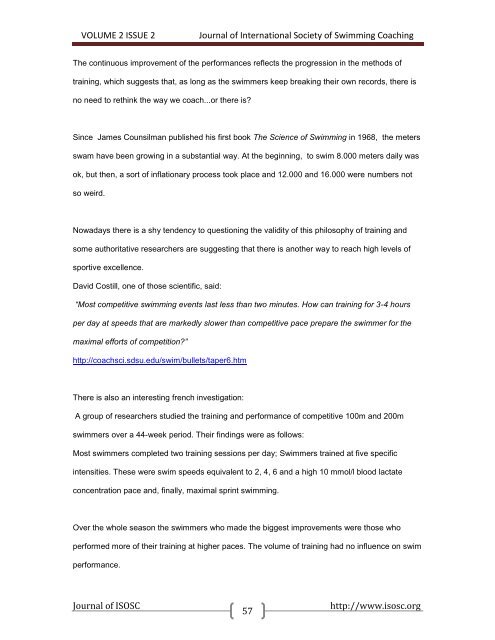Volume%202%20issue%202%20isosc
Volume%202%20issue%202%20isosc
Volume%202%20issue%202%20isosc
Create successful ePaper yourself
Turn your PDF publications into a flip-book with our unique Google optimized e-Paper software.
VOLUME 2 ISSUE 2 Journal of International Society of Swimming Coaching<br />
The continuous improvement of the performances reflects the progression in the methods of<br />
training, which suggests that, as long as the swimmers keep breaking their own records, there is<br />
no need to rethink the way we coach...or there is?<br />
Since James Counsilman published his first book The Science of Swimming in 1968, the meters<br />
swam have been growing in a substantial way. At the beginning, to swim 8.000 meters daily was<br />
ok, but then, a sort of inflationary process took place and 12.000 and 16.000 were numbers not<br />
so weird.<br />
Nowadays there is a shy tendency to questioning the validity of this philosophy of training and<br />
some authoritative researchers are suggesting that there is another way to reach high levels of<br />
sportive excellence.<br />
David Costill, one of those scientific, said:<br />
“Most competitive swimming events last less than two minutes. How can training for 3-4 hours<br />
per day at speeds that are markedly slower than competitive pace prepare the swimmer for the<br />
maximal efforts of competition?”<br />
http://coachsci.sdsu.edu/swim/bullets/taper6.htm<br />
There is also an interesting french investigation:<br />
A group of researchers studied the training and performance of competitive 100m and 200m<br />
swimmers over a 44-week period. Their findings were as follows:<br />
Most swimmers completed two training sessions per day; Swimmers trained at five specific<br />
intensities. These were swim speeds equivalent to 2, 4, 6 and a high 10 mmol/l blood lactate<br />
concentration pace and, finally, maximal sprint swimming.<br />
Over the whole season the swimmers who made the biggest improvements were those who<br />
performed more of their training at higher paces. The volume of training had no influence on swim<br />
performance.<br />
Journal of ISOSC http://www.isosc.org<br />
57


